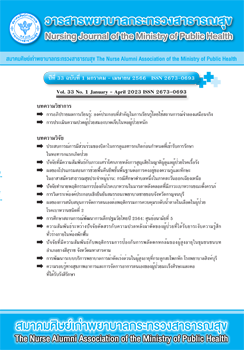Health Literacy, Symptoms and Self-Symptom Management of Head and Neck Cancer Patients’ ongoing Radiation Treatment
Main Article Content
Abstract
Inadequate health literacy has been shown to impact health outcomes of patients with cancer. However, there are limited studies about functional health literacy, symptoms, and self-management in head and neck cancer patients. This cross-sectional descriptive study aimed to study functional health literacy, symptoms and self-management in head and neck cancer patients’ ongoing radiation treatment. The sample consisted of 110 head and neck cancer patients receiving radiotherapy at the Cancer Hospital between January 2021 - April 2021. Purposive sampling with inclusion criteria was used. The research tools included Brief Health Literacy Screen, and symptom and self-symptom management questionnaires. Data were analyzed using descriptive statistics, frequency, percentage, mean and standard deviation. The results found that the majority of the sample was male (73.50%) and the average age was 58.13 years (SD ± 15.65). The educational level of most of the sample was elementary school (77.6%) and the most common cancer location of the head and neck was the nasopharynx (27.27%). Adequate functional health literacy was 60.09%. The most common symptoms found were xerostomia (52.7%) of and fatigue (50.9%) . The severity of the symptoms was moderate for both xerostomia and fatigue.. Self-management of the symptoms of xerostomia were to drink water and gargle. Fatigue was managed by bed rest and consuming sweet drinks.
Article Details

This work is licensed under a Creative Commons Attribution-NonCommercial-NoDerivatives 4.0 International License.
บทความและรายงานวิจัยในวารสารพยาบาลกระทรวงสาธารณสุข เป็นความคิดเห็นของ ผู้เขียน มิใช่ของคณะผู้จัดทำ และมิใช่ความรับผิดชอบของสมาคมศิษย์เก่าพยาบาลกระทรวงสาธารณสุข ซึ่งสามารถนำไปอ้างอิงได้
References
Ferlay J, Colombet M, Soerjomataram I, Parkin DM, Piñeros M, Znaor A, et al. Cancer statistics for the year 2020: An overview. International Journal of Cancer.2021;149(4):778-89.
Sung H, Ferlay J, Siegel RL, Laversanne M, Soerjomataram I, Jemal A, et al. Global cancer statistics 2020: GLOBOCAN estimates of incidence and mortality worldwide for 36 cancers in 185 countries. CA: a Cancer Journal for Clinicians.2021;71(3):209-49.
National Cancer Institute. Hospital-Based Cancer Registry 2020. In: Health DoMSMoP, editor.: National Cancer Institute;2021.
Aupérin A. Epidemiology of head and neck cancers: an update. Current Opinion in Oncology.2020;32(3):178-86.
Borsetto D, Fussey J, Fabris L, Bandolin L, Gaudioso P, Phillips V, et al. HCV infection and the risk of head and neck cancer: A meta-analysis. Oral Oncology.2020;109:104869.
Rogers S, Waylen A, Thomas S, Penfold C, Pring M, Waterboer T, et al. Quality of life, cognitive, physical and emotional function at diagnosis predicts head and neck cancer survival: Analysis of cases from the Head and Neck 5000 study. European Archives of Oto-Rhino-Laryngology.2020;277(5):1515-23.
Palmieri M, Sarmento DJ, Falcão AP, Martins VA, Brandão TB, Morais-Faria K, et al. Frequency and evolution of acute oral complications in patients undergoing radiochemotherapy treatment for head and neck squamous cell carcinoma. Ear, Nose & Throat Journal.2021;100(5_suppl):449S-55S.
Sunaga T, Nagatani A, Fujii N, Hashimoto T, Watanabe T, Sasaki T. The association between cumulative radiation dose and the incidence of severe oral mucositis in head and neck cancers during radiotherapy. Cancer Reports.2021;4(2):e1317.
Einarsson S, Laurell G, Ehrsson YT. Mapping the frequency of malnutrition in patients with head and neck cancer using the GLIM Criteria for the Diagnosis of Malnutrition. Clinical Nutrition ESPEN.2020;37:100-6.
Zhang L, Tang G, Wei Z. Prophylactic and therapeutic effects of curcumin on treatment-induced oral mucositis in patients with head and neck cancer: a meta-analysis of randomized controlled trials. Nutrition and Cancer.2021;73(5):740-9.
Gupta V, Hicks D, Liu J, Sharma S, Bakst R. The Effect of Radiation Dose to the Pharyngeal Constrictor Musculature on Weight Loss During Treatment and Feeding Tube Dependence in Head and Neck Cancer. International Journal of Radiation Oncology, Biology, Physics.2020;108(2):E45.
Jin S, Lu Q, Sun Y, Xiao S, Zheng B, Pang D, et al. Nutrition impact symptoms and weight loss in head and neck cancer during radiotherapy: a longitudinal study. BMJ Supportive & Palliative Care.2021;11(1):17-24.
Clarke N, Dunne S, Coffey L, Sharp L, Desmond D, O’Conner J, et al. Health literacy impacts self-management, quality of life and fear of recurrence in head and neck cancer survivors. Journal of Cancer Survivorship. 2021;15(6):855-65.
World Health Organization. Health Promotion Glossary. In: Division of Health Promotion. www.who. int/hpr/NPH/docs/hp_glossary_en.pdf World Health Organization, Geneva;1998.
Nutbeam D, Lloyd JE. Understanding and responding to health literacy as a social determinant of health. Annu Rev Public Health.2021;42(1):159-73.
Nutbeam D, Muscat DM. Advancing health literacy interventions. Health literacy in clinical practice and public health: IOS Press;2020.p.115-27.
Nilsen ML, Moskovitz J, Lyu L, Harrison C, Randazza E, Peddada SD, et al. Health literacy: impact on quality of life in head and neck cancer survivors. The Laryngoscope.2020;130(10):2354-9.
Khamho M, Wanitkun N, Danaidutsadeekul S, Thephamongkhol K. Predictive model of quality of life in patients with head and neck cancer after radiotherapy. Nursing Science Journal of Thailand.2018;36(2):54-66.
Altin SV, Finke I, Kautz-Freimuth S, Stock S. The evolution of health literacy assessment tools: a systematic review. BMC Public Health.2014;14(1):1-13.
Chew LD, Bradley KA, Boyko EJ. Brief questions to identify patients with inadequate health literacy. Family Medicine.2004;36(8):588–94.
Prasertsang A WV, Chayaput P, Keskool P,. Comparisons of performance status, pain, nutrition impact symptoms, sleep quality, and nutritional status between adult and older adult patients with head and neck cancer. Royal Thai Army Nurses.2021;22(3):160-7.

